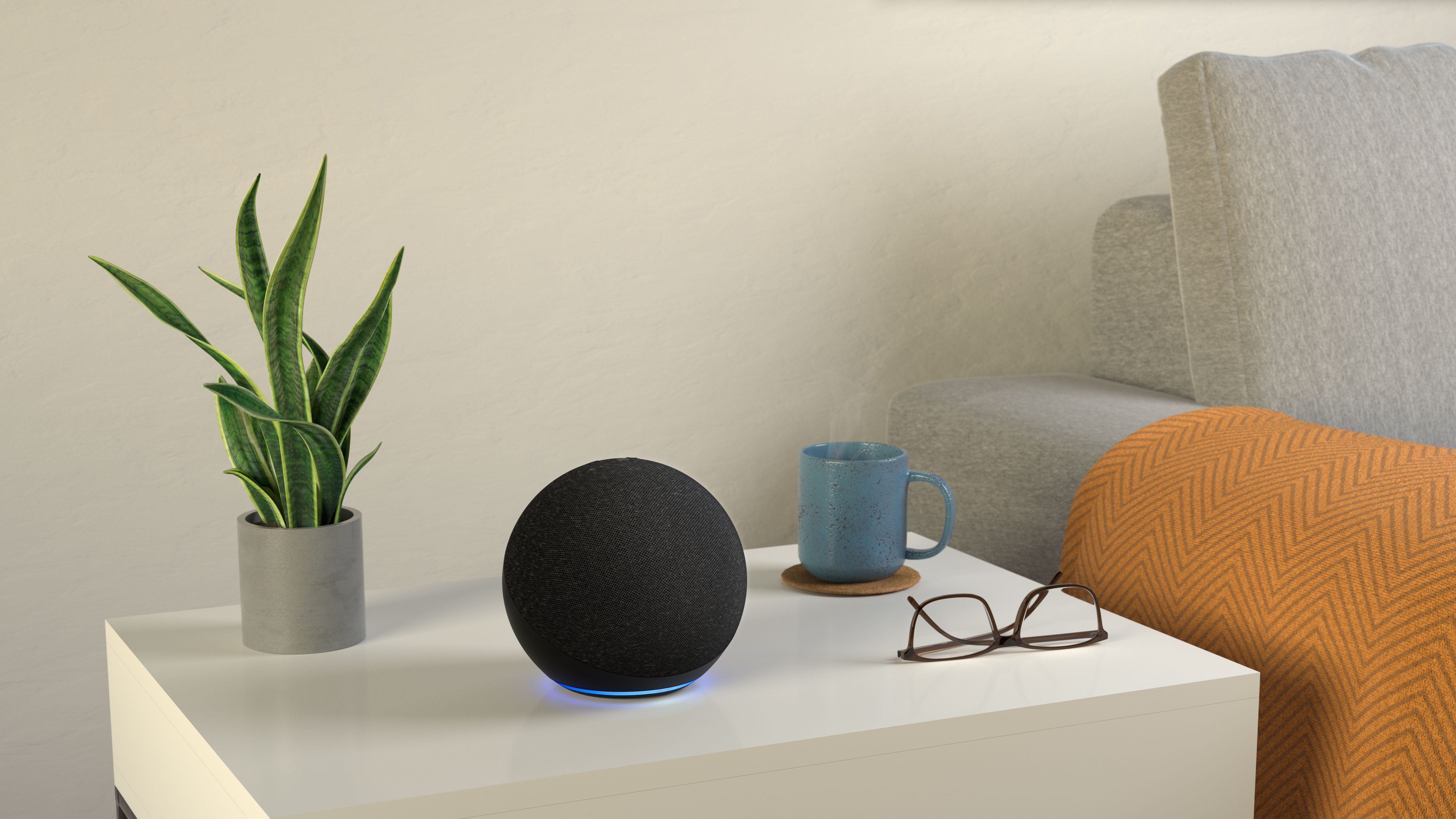Think Alexa, Google Assistant, and Siri are gimmicks? You'd better think again...
Smart speaker sales are rocketing

Sign up for breaking news, reviews, opinion, top tech deals, and more.
You are now subscribed
Your newsletter sign-up was successful
Barking orders at your smart home gadgets was once just a pastime featured in outdated sci-fi movies, and nobody does it in real life, right? Wrong.
Smart speakers with built-in voice assistants have grown hugely in popularity over the past six years since the Amazon Echo first launched, and is now a key way many of us are interacting with our tech.
In the last year, market research institute GfX reports sales of smart speakers increased by 61%, more than ever before, making it the most popular smart home device of 2020.
According to GfK, voice control has gone from a gimmick to the primary way we interact with our smart home gadgets. The improvement in how natural voice assistants have become has certainly helped make voice-control more acceptable. Gone is the stilted, almost robot-like tones in favor of a more rhythmic, human-like delivery. They can handily update you on your daily appointments, give you a rundown of the news or answer your burning questions. This frees you up to do other things, saving you precious time.
They’re more accurate these days too. Research by Loop Ventures, revealed that out of 800 questions they asked voice assistants, Google Assistant understood all of them and answered 92.9% correctly, while Alexa understood 99.9% and got 79.8% correct.
Finally, Siri was able to understand 99.8% of the questions and managed to correctly answer 83.1%. A year earlier, those figures had been 86%, 61%, and 79% respectively.
- Find out how to change every Alexa privacy setting
- Check out our round-up of the best smart displays
- The best smart speaker deals
Most of us didn’t relish the thought of speaking to an inanimate object when smart speakers first launched - I certainly didn't and my friends and family were in the same boat.
Sign up for breaking news, reviews, opinion, top tech deals, and more.
I was sure I was still the sort of person that preferred typing a request for Siri on my iPhone, and slyly muttered into my Apple Watch fearing I’d be mistaken for impersonating Buzz Lightyear.
But recently I realised just how much time using a voice assistant saved me. Saying just one word; “Goodnight”, to Alexa turns off my TV in the lounge, all the lights downstairs, and arms my indoor security camera, without having to dash around flicking switches.
Now there are several smart speakers in my home and I talk to them regularly, as they’re the primary method of controlling everything from smart lights to video doorbells. So how did voice control in the home go from being so unwanted to so accepted?
More time at home
Last year, obviously, saw us spending more time than ever before at home. According to research by Yale, an average of eight hours more per day were spent at home, 46% up on 2019 when the average was nine hours.
It's likely many people were looking to find things to fill their time with, and as consumer spending on tech went up - research by Deloitte, revealed 21% of Brits purchased at least one new gadget during the pandemic - it appears as though smart home tech was one of the solutions.
Also, for the tech-shy, smart speakers are some of the simplest gadgets to get to grips with. Aside from set-up, which does require a smartphone, everything can be done with your voice or using the mute button on the device itself.
Alexa, Google Assistant, and Siri have come on leaps and bounds when it comes to having a more natural-sounding conversation over the past few years, and this has likely contributed to more people buying smart speakers.
Initially, they required their wake word, or the phrase that made them jump into action, to be uttered for every query you asked.
However, they have now learnt to have continued conversations that don’t require shouting 'ALEXA' or 'OK, GOOGLE' for every different request. In fact, these days it’s not uncommon for one of the Amazon Echos in my home to wish me a nice day when I’m conversing with it.
Similarly, I always say ‘please’ and ‘thank you’ when talking to Alexa, as the more natural-sounding voices make one instantly gravitate towards normal conversation ticks.
Voice assistants are self-learning so they’ll constantly keep getting better. In fact, Amazon is already using artificial intelligence to anticipate the different phrases and responses you might use when asking Alexa a question, so it can answer your query successfully without requiring a set phrase to be spoken.
Privacy concerns
Smart speakers are always listening for their wake word or phrase, and they record your request once you’ve used that word or phrase so your request can be processed and correctly responded to.
Also, new ‘behavior-related’ abilities are being developed so you no longer need to worry about all that pesky voice use. Alexa can also proactively control your smart home gadgets based on your previous requests and behavior, through a feature called Alexa Hunches.
That, combined with the fact smart speakers are always listening, throws up several privacy concerns and for many may be a reason not to have a voice-powered gadget in your home.
However, as well as physical buttons that cut the power to the microphones, and in the case of smart displays, cameras on the device, it’s now also possible to ask voice assistants to delete the recordings they have made, which may have quelled through privacy fears for some at least.
The final, and most likely reason we’re speaking to our devices more, is that we’re buying more of them. Smart speakers were relatively expensive when they first came on the scene.
The original Amazon Echo cost $180 / £149.99 / AU$230 when it first launched compared to $99.99 / £89.99 / AU$149 for the Amazon Echo (2020). Similarly, Google Home was $129 / £129 / AU$199 when it launched in 2017, but its successor Google Nest Audio costs $99 / £89 / AU$149.
In fact, you can pick up the smallest smart speakers such as the Amazon Echo Dot or Google Nest Mini for as little as $20 / £20 / AU$34. Thanks to Black Friday and Amazon Prime Day, these smart speakers are often discounted during the year too - we’ve seen them drop as low as $9.99 / £9.99 / $AU$17.99 - which certainly makes them more appealing.
The surge in popularity of voice assistants has certainly been surprising, but it’s clear whether you like it or not, they’re here to stay and will find a way into your home through one device or another.
So it’s time to learn to live with them or at least disable them, otherwise, you could find yourself jolted from your sweet dreams because your voice assistant has chosen to answer your nightly mumblings.
- Check out the best Alexa speaker deals

Carrie-Ann Skinner was formerly Homes Editor at TechRadar, and has more than two decades of experience in both online and print journalism, with 13 years of that spent covering all-things tech. Carrie specializes in smart home devices such as smart plugs and smart lights, as well as large and small appliances including vacuum cleaners, air fryers, stand mixers, and coffee machines. Carrie is now a copy editor at PWC.